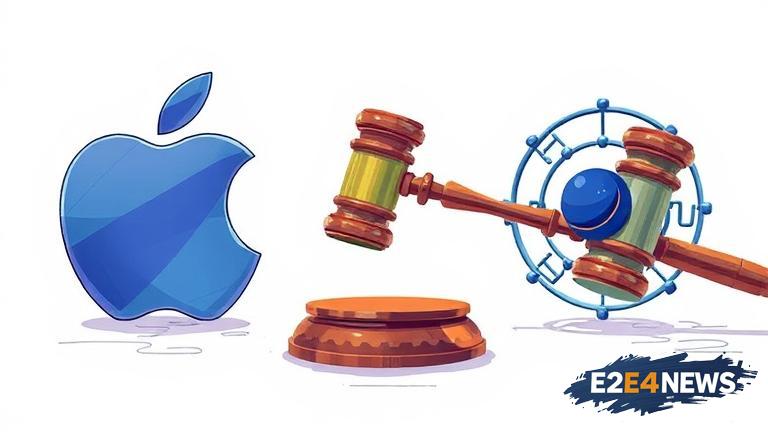In a shocking move, XAI, a company founded by billionaire entrepreneur Elon Musk, has filed a lawsuit against tech giants Apple and OpenAI, alleging that they have engaged in anti-competitive practices and are monopolizing the artificial intelligence (AI) market. The lawsuit, which was filed in a US court, claims that Apple and OpenAI have used their market power to stifle competition and limit innovation in the AI sector. XAI alleges that Apple’s control over the App Store and OpenAI’s dominance in the AI research and development space have created an unfair playing field, making it difficult for other companies to compete. The lawsuit also claims that Apple and OpenAI have used their market power to acquire and shut down competing AI companies, further solidifying their grip on the market. XAI is seeking damages and injunctive relief, and is asking the court to order Apple and OpenAI to cease their alleged anti-competitive practices. The lawsuit is the latest development in the ongoing saga of the AI market, which has seen significant consolidation and competition in recent years. The AI market is expected to continue to grow rapidly in the coming years, with estimates suggesting that it will reach $190 billion by 2025. As the market continues to evolve, it is likely that we will see more competition and innovation, as well as increased scrutiny from regulators and lawmakers. The lawsuit filed by XAI is a significant development in this space, and will likely have far-reaching implications for the AI industry. The case is also likely to draw attention to the issue of monopoly power in the tech industry, and the need for greater regulation and oversight. In recent years, there have been growing concerns about the power and influence of large tech companies, and the impact that they have on competition and innovation. The lawsuit filed by XAI is a significant step in addressing these concerns, and will likely be closely watched by regulators, lawmakers, and industry observers. The AI market is a critical sector, with significant implications for a wide range of industries, including healthcare, finance, and transportation. As the market continues to grow and evolve, it is essential that we have a fair and competitive playing field, where companies can innovate and compete without fear of reprisal or exclusion. The lawsuit filed by XAI is an important step in achieving this goal, and will likely have significant implications for the future of the AI industry. In addition to the lawsuit, there are also likely to be significant regulatory and legislative developments in the coming years, as lawmakers and regulators seek to address the issue of monopoly power in the tech industry. The US Federal Trade Commission (FTC) has already launched an investigation into the AI market, and is likely to take a close look at the practices of companies like Apple and OpenAI. The European Union has also taken steps to regulate the AI market, and has introduced new rules and guidelines for the development and deployment of AI systems. As the regulatory landscape continues to evolve, it is likely that we will see significant changes in the way that companies like Apple and OpenAI operate, and the way that they interact with competitors and customers. The lawsuit filed by XAI is an important step in this process, and will likely have significant implications for the future of the AI industry. The case is also likely to draw attention to the issue of innovation and competition in the tech industry, and the need for greater investment and support for startups and small businesses. The AI market is a critical sector, with significant implications for a wide range of industries, and it is essential that we have a fair and competitive playing field, where companies can innovate and compete without fear of reprisal or exclusion. The lawsuit filed by XAI is an important step in achieving this goal, and will likely have significant implications for the future of the AI industry. The company’s decision to file a lawsuit against Apple and OpenAI is a significant development, and will likely be closely watched by industry observers and regulators. The case is also likely to draw attention to the issue of monopoly power in the tech industry, and the need for greater regulation and oversight. As the regulatory landscape continues to evolve, it is likely that we will see significant changes in the way that companies like Apple and OpenAI operate, and the way that they interact with competitors and customers. The lawsuit filed by XAI is an important step in this process, and will likely have significant implications for the future of the AI industry. The AI market is a critical sector, with significant implications for a wide range of industries, and it is essential that we have a fair and competitive playing field, where companies can innovate and compete without fear of reprisal or exclusion. The lawsuit filed by XAI is an important step in achieving this goal, and will likely have significant implications for the future of the AI industry. The company’s decision to file a lawsuit against Apple and OpenAI is a significant development, and will likely be closely watched by industry observers and regulators. The case is also likely to draw attention to the issue of innovation and competition in the tech industry, and the need for greater investment and support for startups and small businesses. The AI market is a critical sector, with significant implications for a wide range of industries, and it is essential that we have a fair and competitive playing field, where companies can innovate and compete without fear of reprisal or exclusion. The lawsuit filed by XAI is an important step in achieving this goal, and will likely have significant implications for the future of the AI industry.
